Guess what? The Internet is full of b******t and its volume is rapidly replicating – mostly unchecked. Much of the spurious info we find on the Web originates from amateur “we the media” types. However, more and more mis/disinformation is purposefully propagated by partisan entities, some with nefarious agendas. A Google search on “Martin Luther King” produces a top five result, “Martin Luther King Jr. – A True Historical Examination.” It was created by a white supremacist organization.
What’s worse, the identities of those bankrolling the dissemination of such digital propaganda often are hidden…legally.
As the November elections draw nearer, the online explosion and public consumption of factually challenged news and information threatens the very foundation of our democracy. (Thank you, Justice Roberts.)
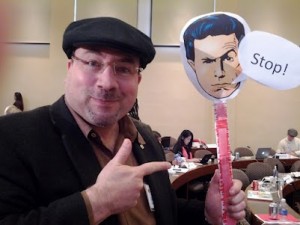 |
| Craig Newmark & Colbert’s Speaker Flag |
With the (Herculean) goal of exploring remedies for an increasingly untrustworthy digital media environment, I ventured to Harvard Law School yesterday to participate in the first Truthiness in Digital Media conference.
Joining me were a who’s who of media pundits, legal scholars, hackers, media watchdog and public advocacy groups, nearly all of whom were painfully aware of the dangers digital delusion holds in a democracy.
Craig Silverman, formerly of Columbia Journalism Review who’s toiling since November for the Poynter Institute, re-posted the conference description here:
This conference will focus on exploring the many facets of this complex issue with an eye to crafting tools and strategies to ameliorate the negative impacts of deception, bias, and inaccuracy in the digital media ecosystem. We hope to come to a better position to take advantage of the benefits promised by digital media while appreciating the positive aspects of creative media-making and probing the blurred boundaries between nefarious and beneficial media shaping practices.
 |
| This blogger at left. (Photo: Craig Newmark) |
And Cambridge-based Nieman Journalism Lab live-blogged the event here. More here on the Truthiness blog.
As someone who’s made a career out of trying to wrap his arms around what makes a story meme catch fire in traditional news media, and more recently in the blogosphere and social channels, I had more than a passing interest in the conference’s theme and purpose.
I also may have been the only PR professional there other than the PR Director for the Ford Foundation and Wendell Potter who outed an unfortunate side of the industry with his PR-antagonistic book about his work spinning for a giant health insurer. Most everyone else in that room were intensely smart and committed activists. Needless to say, many held the PR industry in relatively low esteem.
Fortunately, I still subscribe to PRSA’s code of ethics (and Harold Burson). I firmly believe that quality journalism is even more essential today in an increasingly polluted news ecosystem. (Maybe it was my past work for The New York Times and The AP that cemented my stalwart POV on this.) Conference attendee Micah Sifrey said it like this:
“If the media is the immune system of democracy, as Craig Newmark likes to say, then the act of asking questions of the powerful might be thought of as the mitochondria, the energy source that powers the immune system.”
Attendees heard from a range of esteemed presenters and were encouraged to hit the red button to liven their microphones to chime in. Some of the presentations that resonated for me included:
Wendell Potter, Cigna’s former PR chief-turned-whistleblower who wrote Deadly Spin. He noted that the diminished news ranks have given corporations an upper hand in propagating their messages. He also acknowledged the increasingly important role fact-checking orgs play in the new digital/social media ecosystem.
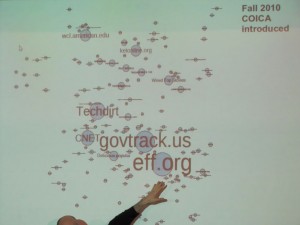 |
| What Influenced SOPA/PIPA’s demise |
Berkman Center’s Yochai Benkler analyzed the underpinnings of the SOPA/PIPA defeat, and gave considerable credit to TechDirt and other influential tech media sites, though it was clear that they didn’t act alone. Other “action-oriented sites” made important contributions to the demise of the proposed bills.
Melanie Sloan, executive director of Citizens for Responsibility and Ethics (CREW), took her five minutes to (rightfully) castigate astroturfing king and PRSA ethics violator Richard Berman who serves as “executive director” of 25 non-profit stealth advocacy organizations, one of which purchased an anti-union commercial…during the Super Bowl telecast!
Next up was Filippo Menczer from Indiana University, which developed Truthy as means to understand how memes spread online. If you like this, watch Jake Porway’s presentation on Cascade from The New York Times’s R&D department.
Filippo was followed Tim Hwang whose presentation on the use of bots to influence the online conversation frightened the heck out of me.
From one Ivy to another, Emily Bell of the Tow Center at Columbia Journalism School, formerly with The Guardian where she played a pivotal role in bringing the UK’s most esteemed newspaper into the digital age, opened by showing the Guardian’s Three Little Pigs video on the state of journalism today:
She then made a couple of observation that resonated with me:
“Allowing people to interact with news content will ‘sustain journalism'”
and
“Very few news orgs have guidelines for consumer engagement, ability to analyze large data sets.”
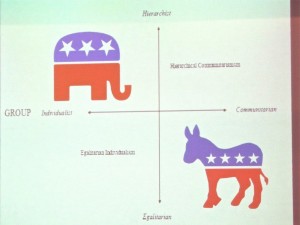 |
| Dem & GOP Orientations (via Chris Mooney) |
In the next session “Biases Abound: You Can’t Handle (or Don’t Want) the Truth,” author Chris Mooney introduced the audience to the term the “Smart Idiot Effect” or “”There is a science of why we deny science.” He shared research that demonstrated how the views of educated political conservatives will not change when faced with cold hard facts that directly contradict their intractable point-of-views.
Furthermore, facts alone for this particular demographic makes them even more emboldened in their thinking. (Not that birthers are educated, but I understood his point.)
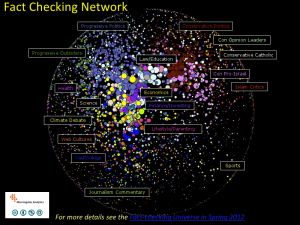
He penned a post today on his experience at the Truthiness event in which he questioned whether there is an easy way to fact-check the vast amount of misinformation out their in the digispheres. He alluded to the above graphic of where these fact-checking orgs reside in relation to one another. He also penned a second post that sums up some of what was discussed yesterday.
I enjoyed hearing UMichigan’s Paul Resnick present the Fact Spreaders and NewsCube tools, and Gilad Lotan demo SocialFlow, which purports to take “a scientific approach to measurably increased engagement.”
Here are a few more tweets emanating from my Macbook Pro yesterday:
@PeterHimler @niemanlab’s @jbenton cites @NPR’s new ethics policy #truthicon News orgs need to make debunking a core purpose.
@PeterHimler @SunFoundation’s @ellnmllr shows Poligraft, a way to see interconnections of entities in news articles. #Truthicon
@PeterHimler Regret the Error’s editor @craigsilverman, formerly @cjr now @Poynter: U.S. newspaper errors at highest level #truthicon
@PeterHimler @Mlsif recommends @cjoh’s new book The Information Diet. Also, ask better questions [to quell misinformation]. #Truthicon
Today, the conference moves over to MIT for a hack day, according to MIT Media Lab’s Ethan Zuckerman, designed to take a “more experimental approach” to the problem versus Harvard’s “more systematic approach.” “We’ll focus on ‘tractable’ vs. ‘intractable’ questions, i.e., little experiments that can measurably thwart disinformation.”
As for me, I’d love to be there, but I’m tied up disseminating fact-based information to the many influencers in the digital spheres on behalf of my clients. Thanks Colin Maclay and the Berkman team for putting on a most elucidating day.
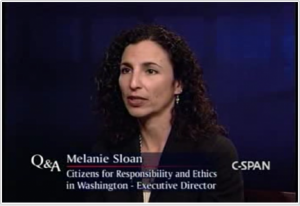
researchpaperwriter Haha 🙂 funny 🙂
Interesting exploration of the ubiquity of false information, as well as how it spreads and becomes reputed in the first place. Along with educating people on how to identify false info (and question everything), fighting misleading info is important to counter diminishing faith in journalism (and the always reviled PR). Maybe meetings like these show we don’t want to sell products or manipulate, but are actually here for truth.